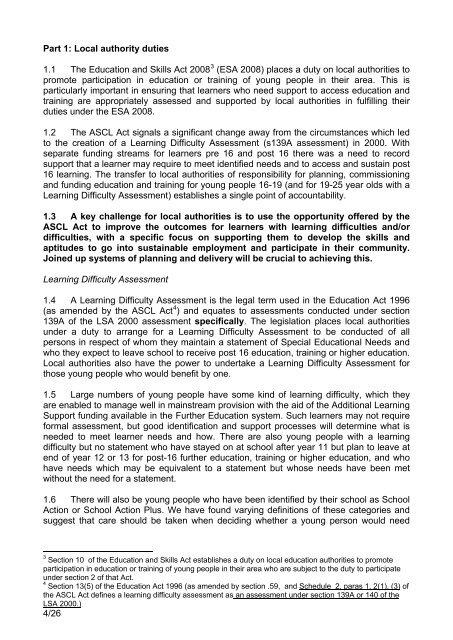Supporting young people with learning difficulties to participate and ...
Supporting young people with learning difficulties to participate and ...
Supporting young people with learning difficulties to participate and ...
Create successful ePaper yourself
Turn your PDF publications into a flip-book with our unique Google optimized e-Paper software.
Part 1: Local authority duties<br />
1.1 The Education <strong>and</strong> Skills Act 2008 3 (ESA 2008) places a duty on local authorities <strong>to</strong><br />
promote participation in education or training of <strong>young</strong> <strong>people</strong> in their area. This is<br />
particularly important in ensuring that learners who need support <strong>to</strong> access education <strong>and</strong><br />
training are appropriately assessed <strong>and</strong> supported by local authorities in fulfilling their<br />
duties under the ESA 2008.<br />
1.2 The ASCL Act signals a significant change away from the circumstances which led<br />
<strong>to</strong> the creation of a Learning Difficulty Assessment (s139A assessment) in 2000. With<br />
separate funding streams for learners pre 16 <strong>and</strong> post 16 there was a need <strong>to</strong> record<br />
support that a learner may require <strong>to</strong> meet identified needs <strong>and</strong> <strong>to</strong> access <strong>and</strong> sustain post<br />
16 <strong>learning</strong>. The transfer <strong>to</strong> local authorities of responsibility for planning, commissioning<br />
<strong>and</strong> funding education <strong>and</strong> training for <strong>young</strong> <strong>people</strong> 16-19 (<strong>and</strong> for 19-25 year olds <strong>with</strong> a<br />
Learning Difficulty Assessment) establishes a single point of accountability.<br />
1.3 A key challenge for local authorities is <strong>to</strong> use the opportunity offered by the<br />
ASCL Act <strong>to</strong> improve the outcomes for learners <strong>with</strong> <strong>learning</strong> <strong>difficulties</strong> <strong>and</strong>/or<br />
<strong>difficulties</strong>, <strong>with</strong> a specific focus on supporting them <strong>to</strong> develop the skills <strong>and</strong><br />
aptitudes <strong>to</strong> go in<strong>to</strong> sustainable employment <strong>and</strong> <strong>participate</strong> in their community.<br />
Joined up systems of planning <strong>and</strong> delivery will be crucial <strong>to</strong> achieving this.<br />
Learning Difficulty Assessment<br />
1.4 A Learning Difficulty Assessment is the legal term used in the Education Act 1996<br />
4<br />
(as amended by the ASCL Act ) <strong>and</strong> equates <strong>to</strong> assessments conducted under section<br />
139A of the LSA 2000 assessment specifically. The legislation places local authorities<br />
under a duty <strong>to</strong> arrange for a Learning Difficulty Assessment <strong>to</strong> be conducted of all<br />
persons in respect of whom they maintain a statement of Special Educational Needs <strong>and</strong><br />
who they expect <strong>to</strong> leave school <strong>to</strong> receive post 16 education, training or higher education.<br />
Local authorities also have the power <strong>to</strong> undertake a Learning Difficulty Assessment for<br />
those <strong>young</strong> <strong>people</strong> who would benefit by one.<br />
1.5 Large numbers of <strong>young</strong> <strong>people</strong> have some kind of <strong>learning</strong> difficulty, which they<br />
are enabled <strong>to</strong> manage well in mainstream provision <strong>with</strong> the aid of the Additional Learning<br />
Support funding available in the Further Education system. Such learners may not require<br />
formal assessment, but good identification <strong>and</strong> support processes will determine what is<br />
needed <strong>to</strong> meet learner needs <strong>and</strong> how. There are also <strong>young</strong> <strong>people</strong> <strong>with</strong> a <strong>learning</strong><br />
difficulty but no statement who have stayed on at school after year 11 but plan <strong>to</strong> leave at<br />
end of year 12 or 13 for post-16 further education, training or higher education, <strong>and</strong> who<br />
have needs which may be equivalent <strong>to</strong> a statement but whose needs have been met<br />
<strong>with</strong>out the need for a statement.<br />
1.6 There will also be <strong>young</strong> <strong>people</strong> who have been identified by their school as School<br />
Action or School Action Plus. We have found varying definitions of these categories <strong>and</strong><br />
suggest that care should be taken when deciding whether a <strong>young</strong> person would need<br />
3 Section 10 of the Education <strong>and</strong> Skills Act establishes a duty on local education authorities <strong>to</strong> promote<br />
participation in education or training of <strong>young</strong> <strong>people</strong> in their area who are subject <strong>to</strong> the duty <strong>to</strong> <strong>participate</strong><br />
under section 2 of that Act.<br />
4 Section 13(5) of the Education Act 1996 (as amended by section .59, <strong>and</strong> Schedule 2, paras 1, 2(1), (3) of<br />
the ASCL Act defines a <strong>learning</strong> difficulty assessment as an assessment under section 139A or 140 of the<br />
LSA 2000.)<br />
4/26
















